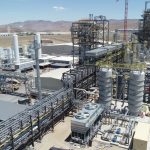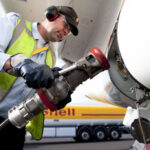Virgin Atlantic has purchased 2.5 million litres (2,000 tonnes) of sustainable aviation fuel from Neste for use in its UK operations and is expected to be delivered in the first half of this year. The SAF will be sourced from renewable waste and residue raw materials, with the supply and distribution of the blended fuel managed by ExxonMobil, the airline’s largest fuel supplier at London Heathrow. Neste says its MY Sustainable Aviation Fuel, in its neat form, can reduce GHG emissions by up to 80% on a life-cycle basis compared with fossil jet fuel. Having operated the airline industry’s first-ever biofuel flight back in 2008 from Heathrow, Virgin Atlantic says the agreement with Neste represents its first commercial supply of SAF in the UK and an important step towards the airline’s target of 10% SAF by 2030. Meanwhile, the Virgin Group has formed a strategic partnership with chemical conversion company Agilyx to research and develop lower carbon fuels, including SAF, produced from plastic waste. A first waste-to-fuel facility is planned to be in the US, with an aspiration to roll out similar plants in other countries, including the UK.
Commenting on the Neste SAF fuel purchase for its Heathrow operations, Holly Boyd-Boland, VP Corporate Development at Virgin Atlantic, said: “After fleet renewal, SAF represents the greatest opportunity to decarbonise aviation in the short to medium term. This supply is the beginning of commercial SAF at scale for Virgin Atlantic and whilst only enough to operate 140 flights between London and New York, it’s a starting point.
“To meet our 10% SAF target in 2030 we need to deliver this volume 70 times over, requiring cross-industry and government action to support commercialisation of SAF at scale, particularly in the UK. We will continue to work closely with Neste and ExxonMobil, as well as wider industry partners, to find innovative solutions to achieve this goal.”
Responded Jonathan Wood, VP Renewable Aviation at Neste: “We are ready to support the aviation industry and UK government’s policy ambitions to increase the use of SAF to at least 10% by 2030. We need to act now – SAF is a proven solution with clear benefits and is already available today.”
Added Paul Greenwood, Chairman of Esso UK, a subsidiary of ExxonMobil: “We’re proud to play our part in this pioneering agreement, facilitating a safe, secure and reliable supply of lower emission aviation fuel via our dedicated pipeline network.”
The Virgin Group partnership with Agilyx, in which it has been an investor for many years, aims to break down unrecyclable plastic waste through a pyrolysis process to produce synthetic crude oil that will then be refined into a lower carbon fuel. The two partners intend to work on the development of production facilities based on Agilyx’s proprietary conversion technology. Cyclyx, a feedstock company that is majority owned by Agilyx, will source the plastic waste to be used for the fuel in the first facility.
“This platform is unique as it will be used for lower carbon fuels and has the future opportunity for the production of circular plastics,” said Tim Stedman, CEO of Agilyx. “We view plastic waste as a valuable above ground resource that is not widely tapped into. Through our technology, we aim to unlock the value of plastic waste that otherwise may have been destined for landfill or incineration.”
The Virgin Group says it wants to provide the solution to the global market and expects Virgin Atlantic and other Virgin companies to be early adopters as part of the group’s net zero by 2050 ambitions.
“The creation of lower carbon fuel is an important step in the journey towards net zero. We are very pleased to be adding this project to the range of investments we continue to make aimed at addressing these issues,” commented Josh Bayliss, CEO of the Virgin Group.
Shai Weiss, CEO of Virgin Atlantic, said although sustainable aviation fuel was the key solution for decarbonising the aviation sector, there was still a long way to go. “Clearing the skies for tomorrow requires radical collaboration across innovators, producers, investors and airlines,” he said. “We are delighted that Virgin Group and Agilyx are leading the charge to pilot new pathways in lower carbon fuels and we look forward to working closely with them to achieve our 10% SAF target by 2030.”
Photo: Virgin Atlantic













More News & Features
SAF One announces new investment and technology partners for Middle East SAF project
New initiative formed to accelerate SAF adoption and production in the Pacific Northwest
EcoCeres opens new Malaysia production facility as SAF ambition in Asia scales up
Aviation, shipping and fuel leaders convene in Rotterdam to accelerate sustainable fuels scale-up
EU SAF mandates will have to be revised, predicts French oil chief
Lessons learned from the collapse of Fulcrum BioEnergy